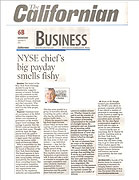Integrity
Matters
September 10, 2003
NYSE
chief's big payday smells fishy

 Question: (E-066)
Question: (E-066)
Dear
Jim:
The
board of the New York Stock Exchange decided to pay its
top administrator a gigantic amount of money. Perhaps
you will comment on the $140 million accumulated back
pay and benefits paid to Richard Grasso, chairman and
chief executive. Who will pay for these obscene fees?
It is the little people, yet again.
 Response:
Response:
Chairman
Richard Grasso's acceptance of the $139.5 million
has reignited the debate over standards of governance
at the world's largest stock exchange. His package
is greater than the NYSE's total net income for
the past three years. Though perfectly legal, the huge
payout feeds the public's perception of Wall Street
as a rigged game that enriches a few big players, while
small investors get bilked.
Who
is responsible for this gigantic compensation? It's
the Board of Directors of the New York Stock Exchange.
The board appears to have acted very generously, possibly
irresponsibly, certainly insensitively. For starters those
rewarding Grasso (the compensation committee and board)
are individuals and organizations over whom he has regulatory
authority and responsibility. This has some parallel to
a group of motorists directly rewarding the police officer
who has the authority to enforce traffic laws.
Where
the money is coming from might become clearer when we
know that a group of 1,366 seat-holders of the NYSE is
planning a lawsuit for force Grasso to renegotiate his
controversial pay package. If they feel on the hook for
Grasso's wind-fall then some of their customers -e.g.
individual investors -may feel the sting of costs that
can be legally passed along.
Here
is what we do know: Free markets must regulate themselves
or governments
will. It does not take a rocket scientist to recognize
that oversight committees and other similarly chartered
organizations have a responsibility to protect themselves
and the public from both real and perceived-of conflicts
of interest. Whether Grasso is overpaid is not the concern
of this column. However, the appearance of becoming compromised
in the pursuit of oversight harms the enterprise and can
demoralize an investing public already discouraged by
the bombardment of news that continues reporting scandalous
behaviors throughout our society.
By
way of summary, here are some of the integrity-related
leadership issues:
Grasso's
first duty is to set a good example. His pay package does
anything but. It serves as a tacit endorsement of NYSE
companies that have paid executives lavishly while their
firms have languished. His acceptance of a big payment
financed by the companies he regulates creates the appearance
of a conflict of interest.
Worst
of all, though, Grasso's pay undermines the NYSE's own
efforts to promote corporate reform. It has offered a
number of proposals to encourage corporate boards to stand
up to their CEOs and hold top executives more accountable.
Yet the nine-figure compensation suggests a board only
too eager to please its own chairman.
Greed
is hardly new or surprising. But its display by a public
watchdog such as the New York Stock Exchange suggests
Wall Street may still have a long way to go to clean up
its act. When leaders ignore the importance of maintaining
a proper balance between self-interest and social responsibility,
the free market is at risk.